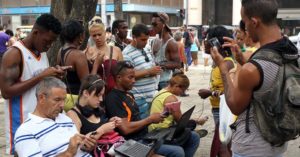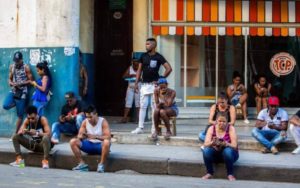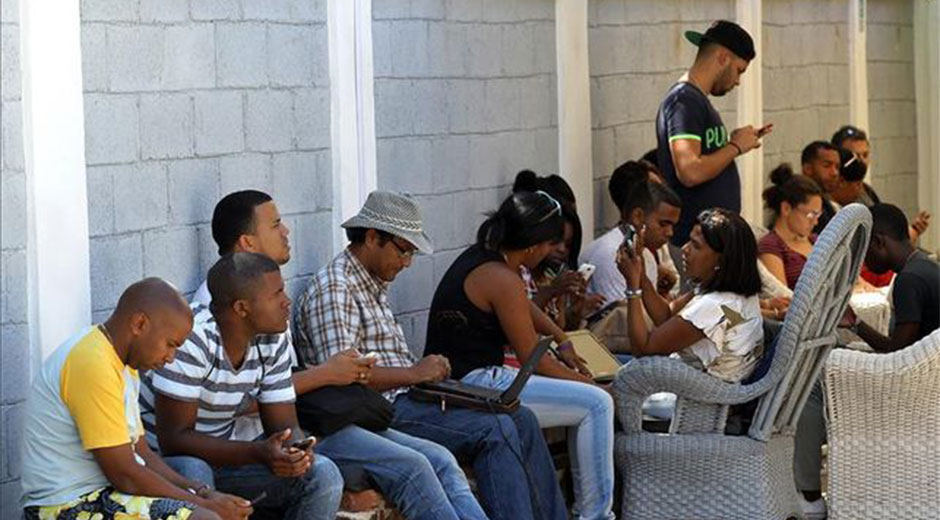 CUBA HABILITA LA NAVEGACIÓN EN INTERNET A TRAVÉS DEL MÓVIL “A MODO DE PRUEBA”.
CUBA HABILITA LA NAVEGACIÓN EN INTERNET A TRAVÉS DEL MÓVIL “A MODO DE PRUEBA”.
Etecsa (El monopolio estatal) explicó que esta prueba permitirá “evaluar y conocer más el servicio próximo a comercializarse”.
La Empresa de Telecomunicaciones de Cuba (Etecsa) inició este martes la primera prueba nacional para navegar en internet a través del servicio móvil. Justo a las 11 de la mañana se habilitó la navegación a través del servicio de datos. La velocidad, sin embargo, es extremadamente lenta, según ha podido comprobar 14ymedio.
Para acceder al servicio de navegación, que durante las pruebas será gratuito, “los clientes de Etecsa deberán tener configurada la la APN Nauta y activar la conexión de datos en su teléfono. Luego los pasos a seguir son: Marcar *133#, la opción Datos (1), la opción Tarifa por consumo (1) y finalmente Activar (1)”, explicó la empresa en un breve comunicado difundido en los medios oficiales.
Etecsa explicó que esta prueba permitirá “evaluar y conocer más el servicio próximo a comercializarse”. La prueba se extenderá hasta las 8:00 pm de este martes.
En julio pasado Tania Velázquez Rodríguez, vicepresidenta de Estrategia de Negocios y Tecnología de la Empresa de Telecomunicaciones de Cuba (Etecsa) afirmó que la infraestructura tecnológica para la comercialización estaba “casi a punto”.
En la actualidad existen más de cinco millones de celulares en Cuba y Etecsa ha hecho un proceso de preparación en sus oficinas comerciales en todo el país para que den respuesta a las dudas que provocará la llegada de internet.
En la actualidad existen más de cinco millones de celulares en Cuba y Etecsa ha hecho un proceso de preparación en sus oficinas comerciales en todo el país para que den respuesta a las dudas que provocará la llegada de internet
Desde hace semanas algunos usuarios privilegiados vienen disfrutando de la navegación web desde sus móviles, entre ellos periodistas oficiales, empresarios extranjeros y diplomáticos.
Hasta ahora el resto de los internautas sólo podía utilizar las zonas wifi de acceso a la web instaladas en plazas y lugares céntricos del país, los terminales públicos ubicados en algunas oficinas de Etecsa o el servicio de Nauta Hogar que este año debe llegar a 52.000 viviendas en todo el país.
Las cifras oficiales registran más de 4,5 millones de usuarios de internet en 2016, la mayoría de ellos desde las zonas wifi instaladas a partir de 2015 o desde los puntos gestionados por Etecsa con terminales pertenecientes a la empresa.
Estos datos son cuestionados por expertos que aseguran que el Gobierno incluye en ellos a los usuarios que se conectan a servicios de intranet, correo electrónico nacional y otros portales alojados en servidores locales.
 CUBANS CHEER AS INTERNET GOES NATIONWIDE FOR A DAY.
CUBANS CHEER AS INTERNET GOES NATIONWIDE FOR A DAY.
Cuba’s government said it provided free internet to the Communist-run island’s more than 5 million cellphone users on Tuesday, in an eight-hour test before it launches sales of the service.
Cuba is one of the Western Hemisphere’s least connected countries. State-run telecommunications monopoly ETECSA announced the trial, with Tuesday marking the first time internet services were available nationwide.
There are hundreds of WiFi hotspots in Cuba but virtually no home penetration.
Dissident blogger Yoani Sanchez, considered the country’s social media pioneer, raved that she had directly sent a tweet from her mobile. In another tweet, she called the test a “citizen’s victory.”
On the streets of Havana, mobile users said they were happy about the day of free internet, even as some complained that connectivity was notably slower than usual.
“This is marvelous news because we can talk with family abroad without going to specific WiFi spots, there is more intimacy,” said taxi driver Andres Peraza.
Forty percent of Cubans have relatives living abroad.
Leinier Valdez, one of a group of young people trying to connect, said, “this is great. Its better and more so when you can connect for free.”
Hotspots currently charge about $1 an hour although monthly wages in Cuba average just $30.
The government has not yet said how much most Cubans would pay for mobile internet, or when exactly sales of the service will begin. But ETECSA is already charging companies and embassies $45 a month for four gigabytes.
Analysts have said broader Web access will ultimately weaken government control over what information reaches people in a country where the state has a monopoly on the media.
Whether because of a lack of cash, a long-running U.S. trade embargo or concerns about the flow of information, Cuba has lagged far behind most countries in Web access. Until 2013, internet was largely only available to the public at tourist hotels on the island.
But the government has since made boosting connectivity a priority, introducing cybercafes and outdoor Wi-Fi hotspots and slowly starting to hook up homes to the Web.
Long before he took office from Raul Castro in April, 58-year-old President Miguel Diaz-Canel championed the cause.
“We need to be able to put the content of the revolution online,” he told parliament in July, adding that Cubans could thus “counter the avalanche of pseudo-cultural, banal and vulgar content” on the internet.
Agencies/Voice of America (VOA)/ 14ymedio, La Habana/ Internet PHotos/ Arnoldo Varona/ TheCubanHistory.com
THE CUBAN HISTORY, HOLLYWOOD.






